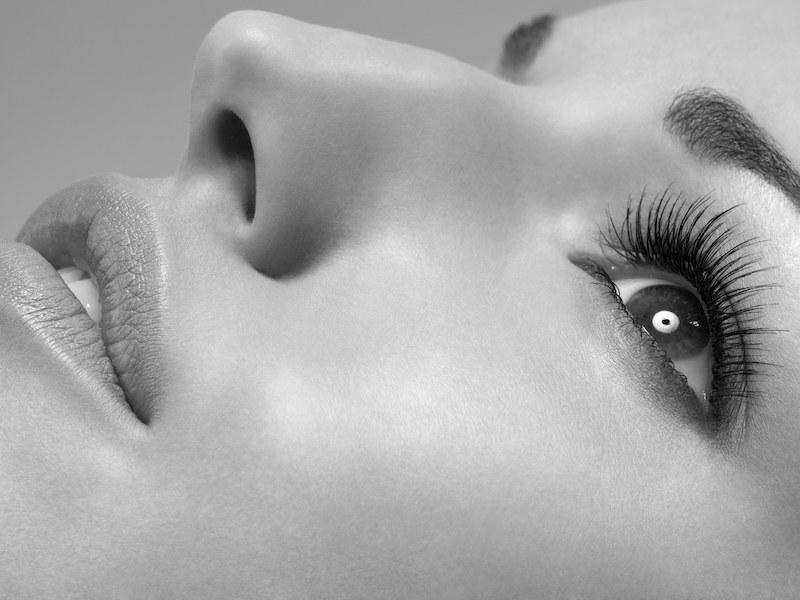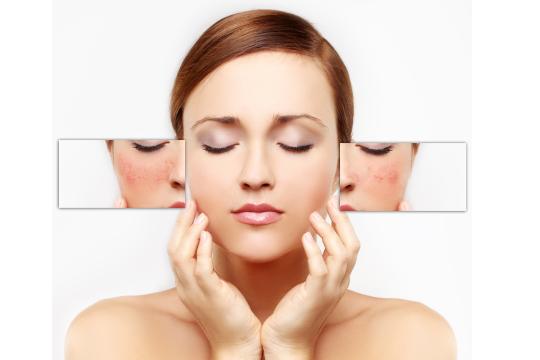You cry over greeting cards, beautiful sunsets, even a heart-stopping sip of grenache. We get it, you’re sensitive. But just because you’re feeling all the feels, doesn’t mean your skin is too. The truth is—the skin you’ve been calling “sensitive” all these years, may not be that at all.
As the Queen of self-diagnosis, I’m always eager to leap onto Google and discover that I have any number of obscure (and not so obscure) ailments. The reality is—I’m usually wrong, and you might be too. What if instead of “sensitive skin” you actually have a skin sensitivity or a skin condition that can be treated and/or avoided all together?
What the heck’s the difference, you ask? Good question. Let’s start by unpacking the term “sensitive skin.”
Sensitive Skin
Sensitive skin is caused by a genetic predisposition where the epidermal barrier that protects the skin isn’t able to properly protect the delicate nerve endings, allowing irritants, bacteria and allergens to creep in and cause itchiness, redness, dryness, skin bumps or erosion, pustules (That word alone… ew.) and all manner of complexion mischief. Typically seen in fairer skinned people, common clues that you have sensitive skin can be a tendency towards blushing and flushing. “Sensitive skin” has become a confusing cultural catch-phrase, but the true meaning of “sensitive skin” is as specific as it is misunderstood and can only truly be diagnosed by your doctor.
Skin Sensitivity
While causing a lot of the same symptoms as sensitive skin, a skin sensitivity is not the same thing. Typically due to environment and lifestyle—as opposed to a genetic predisposition—a skin sensitivity can be exacerbated by sun, wind and pollution damage, too many cocktails, overly aggressive skincare practices, falling prey to the allure of a heavily scented and prettily packaged skin products… the list is long, and excessive exposure to said list can lead to irreversible damage. Let that serve as a warning.
Skin Condition
A skin condition—including rosacea, eczema, and/or allergic contact dermatitis—can be caused by allergies, infections and a number of other unpleasant things. There’s also ever-mounting evidence that a genetic component may be at play. The symptoms of skin conditions often mirror that of sensitive skin and skin sensitivities, which leads us back to the ever-alluring, and not always accurate temptation to self-diagnose. Just don’t.
Instead here are some thing you can do…
Seek a professional diagnosis.
Sensitive skin, skin sensitivities and skin conditions can all cause the same symptoms, and those symptoms aren’t going to treat themselves. Your skin is talking to you, but it’s speaking a language you’re not entirely qualified to understand. You know who is qualified? Your doctor—the single best resource for diagnosing anything untoward that’s going on with your skin.
Be nice.
Good advice in general, but being nice to your skin will go a long way towards avoiding skin triggers and reactions. Here are some ways to be nice to your skin. Trust us, your skin will thank you.
- When it comes to your at-home skincare routine, avoid excessive washing, scrubbing and exfoliating.
- If you find your skin is reacting to microdermabrasion, chemical peels or exfoliants, cut down on the frequency or intensity of these treatments.
- Avoid using skincare products that include alcohol, which can cause excessive dryness.
- Read the ingredients in your skincare products. Be aware of common irritants and allergens like: salicylic acid, alpha hydroxy acids, retinoids, fragrances, formaldehyde, niacinamide (a topical form of the B3 nutrient), chemical peels, physical exfoliators, lanolin, parabens (and any other preservatives that extend shelf life.)
- Be aware of your environmental factors. Excessive cold, heat or moist weather can leave skin more prone to reaction. So can heavy wind or sun exposure.
- Be aware that stress and hormones can also wreck havoc on your skin, sensitive or not.
It’s empowering to know that we have some control over the things that cause damage to our skin, right? On another, less happy hand, we have no one to blame but ourselves. But let’s not dwell on that.
Listen to your skin.
You may not have the Ph.D. in your skin’s language that your doctor does, but that won’t stop your skin from trying to communicate with you. Be aware of your skin’s reactions and try to keep track of anything that triggers a reaction. Here are some more tips on how to “listen” to your skin.
- If you use products that strip skin or are known to irritate skin like peels and acids, remember some irritation, redness and tingling is common (up to about 15 minutes).
- Allow your skin to get used to strong products over time. With a little patience, you can test for a skin sensitivity by doing a 24-hour patch test on your neck or behind your ear. Your skin may tolerate new products by starting slowly—once a week—and then building up your application over time.
- If you have a reaction to something, write down what it is and what the offending product’s ingredients are. You may be allergic to something in the product, which you’ll be able to weed out over time.
- If you find your skin is sensitive to fragrance, remember that fragrance-free and unscented are not equal. There can be fragrances used to mask other scents in “unscented” products.
Navigating the sea of sensitive skin vs. skin sensitivities vs. skin conditions is no small business. A trip to your doctor, proper skincare and being aware of your symptoms, what triggers a reaction and what to do will help alleviate some of the sketchier symptoms related to each. So there you have it, a veritable who’s who of sensitive skin, skin sensitivities and skin conditions—and a pretty strong case for why you should rely solely on your doctor for a properly diagnose. Your skin is talking to you, but only your doctor will know for certain what it’s saying.








